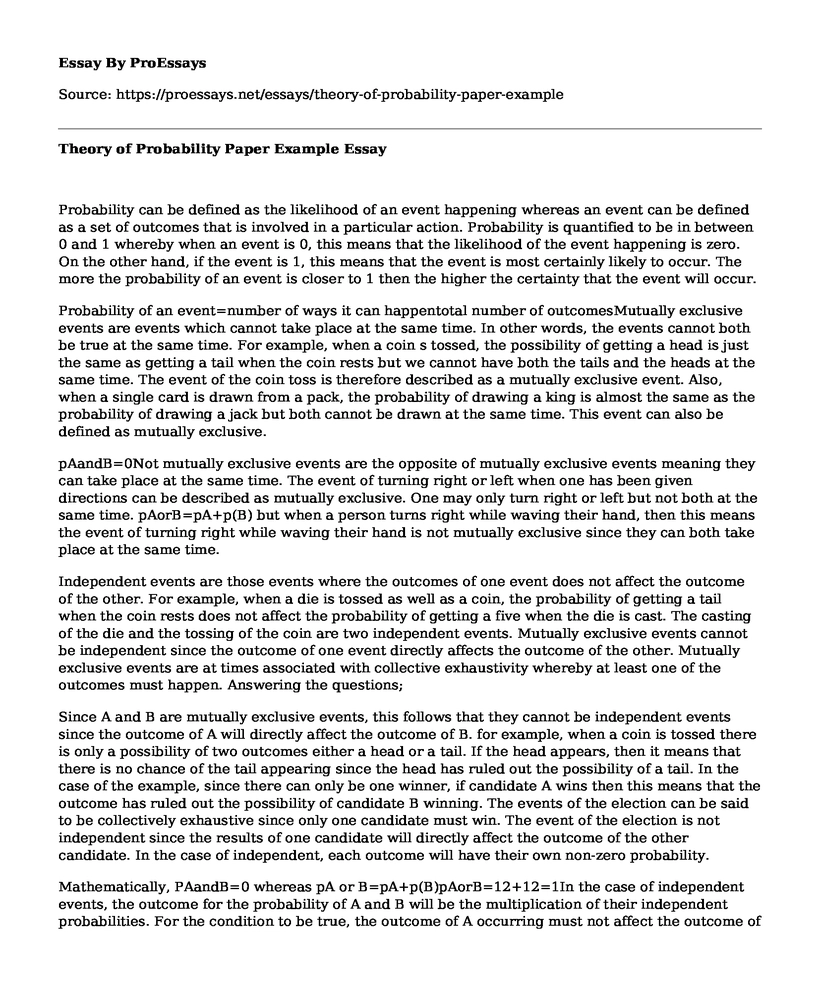Probability can be defined as the likelihood of an event happening whereas an event can be defined as a set of outcomes that is involved in a particular action. Probability is quantified to be in between 0 and 1 whereby when an event is 0, this means that the likelihood of the event happening is zero. On the other hand, if the event is 1, this means that the event is most certainly likely to occur. The more the probability of an event is closer to 1 then the higher the certainty that the event will occur.
Probability of an event=number of ways it can happentotal number of outcomesMutually exclusive events are events which cannot take place at the same time. In other words, the events cannot both be true at the same time. For example, when a coin s tossed, the possibility of getting a head is just the same as getting a tail when the coin rests but we cannot have both the tails and the heads at the same time. The event of the coin toss is therefore described as a mutually exclusive event. Also, when a single card is drawn from a pack, the probability of drawing a king is almost the same as the probability of drawing a jack but both cannot be drawn at the same time. This event can also be defined as mutually exclusive.
pAandB=0Not mutually exclusive events are the opposite of mutually exclusive events meaning they can take place at the same time. The event of turning right or left when one has been given directions can be described as mutually exclusive. One may only turn right or left but not both at the same time. pAorB=pA+p(B) but when a person turns right while waving their hand, then this means the event of turning right while waving their hand is not mutually exclusive since they can both take place at the same time.
Independent events are those events where the outcomes of one event does not affect the outcome of the other. For example, when a die is tossed as well as a coin, the probability of getting a tail when the coin rests does not affect the probability of getting a five when the die is cast. The casting of the die and the tossing of the coin are two independent events. Mutually exclusive events cannot be independent since the outcome of one event directly affects the outcome of the other. Mutually exclusive events are at times associated with collective exhaustivity whereby at least one of the outcomes must happen. Answering the questions;
Since A and B are mutually exclusive events, this follows that they cannot be independent events since the outcome of A will directly affect the outcome of B. for example, when a coin is tossed there is only a possibility of two outcomes either a head or a tail. If the head appears, then it means that there is no chance of the tail appearing since the head has ruled out the possibility of a tail. In the case of the example, since there can only be one winner, if candidate A wins then this means that the outcome has ruled out the possibility of candidate B winning. The events of the election can be said to be collectively exhaustive since only one candidate must win. The event of the election is not independent since the results of one candidate will directly affect the outcome of the other candidate. In the case of independent, each outcome will have their own non-zero probability.
Mathematically, PAandB=0 whereas pA or B=pA+p(B)pAorB=12+12=1In the case of independent events, the outcome for the probability of A and B will be the multiplication of their independent probabilities. For the condition to be true, the outcome of A occurring must not affect the outcome of B. In other words, the occurrence of any of the events must not be affected by previous events.
In order for the condition of independence to be false, then it follows that the events are mutually exclusive.
Works cited
Kolmogorov, Andrei Nikolaevich. Foundations of the Theory of Probability: Second English Edition. Courier Dover Publications, 2018.
Allen, Arnold O. Probability, statistics, and queueing theory. Academic Press, 2014.
Cite this page
Theory of Probability Paper Example. (2022, Jun 22). Retrieved from https://proessays.net/essays/theory-of-probability-paper-example
If you are the original author of this essay and no longer wish to have it published on the ProEssays website, please click below to request its removal:
- Paper Example on Multicomponent Distillation
- Cause of Surface Tension Paper Example
- Research Paper on Meteoroids and Moon
- Is Color a Property of the Mind or an Inherent Characteristic of Nature - Essay Sample
- Essay Example on EBIC Technique in SEM: A Comprehensive Investigation
- Essay Sample on Creating My Own Star System: Project S
- Free Report Sample on Criminal Intelligence Agency: Leveraging Math Models to Improve Decision-Making







